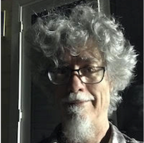He Could be Only a Clown
At Masvingo, near Great Zimbabwe,
when Itai’s mother and father
died of a plague, he was too young
to understand. His aunts and uncles
took him in, but they didn’t want him.
They didn’t give him anything;
they didn’t teach him anything.
He would have been ignored entirely
except that he learned
to make people laugh.
At first it was by accident,
as when he stumbled or spilled something.
He tried to do what other people did,
but when he did it, it was all wrong.
He tried to dance as his cousins danced,
but his ragged clothes and bad timing
made his attempts seem pathetic.
He tried to say important things,
but when people listened to him,
they only laughed. Itai knew
that Mwari gave all his people
a garden and seeds for living well.
For most Shona, this was the protection
of their clan, but as Itai grew up
he learned that cunning and cleverness
worked better for him than kindness.
__
He Dreamed He Was at Sea
In the Welsh village where
Guillaume lived and worked,
conditions were crude.
He was a soap maker
so his relationships
with the potter for lye
and the butcher for lard
were more important
than relationships
with his wife or children.
He could not live
without his big brass pot,
his cast iron hook and chain,
and his large wooden spoons.
But mainly, for Guillaume,
the repetitive tasks of the trade
gave him time to daydream,
and Guillaume dreamed
of sailing over crusty waves,
salty wind blowing his sails,
far from sight of land.
__
She Lived in a Fantasy World
Anahita wouldn’t let
her brothers tell her
anything that happened
in the city of Arbela.
She wanted to make it
into a story in which
a dragon flew down
and ate the bad guy.
If her brothers completed
a profitable sale of bricks,
she wanted it to be a story
about how Marduk
shined a golden light
on the buyer’s house
until his daughter insisted
that they buy the bricks.
In spite of appearances,
she knew that magic
made most things happen
because magic made hearts beat.
__


























0 Comments